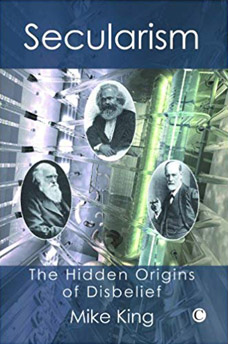

"This is an exceptional book, the fruit of wide reading in religious history and philosophy and of deep thinking. Its subject of secularism is timely, since there is now a growing sense that the Western world (at least) is moving towards a paradigm change in religion.
Frank Parkinson, Network Review No 96, 2008
"A forte of Secularism is the reconsideration of the role of religion during the Enlightenment. Contrary to conventional wisdom, King shows that the vast majority of key Enlightenment thinkers such as Newton, Galileo, Descartes and to some extent even Voltaire, were in fact deeply spiritual people who engaged in arguments about how to reform religion rather than how to destroy it. For them there was little, if any, contradiction between religion on the one hand, and science and reason on the other."
A. Alexander Stummvoll is a PhD Candidate in the Department of Political and Social Sciences at the European University Institute, Fiesole, Italy
Comments from Amazon:
"On the writing of books dealing with religion, spirituality, and secularism there seems no end. King, however, presents us with a whole new multidimensional picture. For most of us, modern secularism rose out of the contingencies of the Enlightenment. King, however, argues that, with rare exception, the Enlightenment thinkers were not atheists and had no intention of eliminating religion but rather of improving it. He argues that the rise of an Eastern style, non-devotional impulse at that time was not accepted but did indeed encouraged the expression of what might be called Atheism. King's perspective is a new and, to my knowledge, a unique one. He guides us through a broad range of thinkers, from Pythagoras to Freud, interweaving and incorporating the thought and perspectives of a variety of Eastern writers and thinkers. His elucidation of the Eastern concepts of "bhakti" and "jnani" will be new to many readers and the use of these concepts (as well as "via negativa" and "via positiva") are vital giving us new perspectives on the historical development of "Western" religion, and of religion and spirituality in general. "
Comments from Facebook:

Non-fiction, 2007, paperback (324 pages)
Spirituality is a difficult subject in the modern world. Everywhere, from popular media to the university, from the bookshelf to the dinner table, religions are derided or marginalised and public figures, such as Richard Dawkins, set upon anyone who admits to a belief in God. It seems that science and religion are fundamentally at odds and that mutual respect is unacceptable to either in their parallel pursuit of 'truth'. Yet most Enlightenment authors engaged with both science and spirituality and did not lose their faith. Today we tend to see these authors as not having applied full scientific rigour to their religious beliefs, but are we correct in dismissing this aspect of their lives so easily? In Secularism, Mike King examines the elements of religion, philosophy and science which have contributed to an almost total disavowal of spirituality by contemporary western intellectuals. He engages with a wide range of thinkers, including Pythagoras, Marx, Spinoza, Darwin and Nietzsche, and incorporates detailed studies of a variety of 'spiritual' leaders, some of whom readers are unlikely to have considered in this way before, to uncover why the western world no longer has any interest in devotion or accords it any respect. . The first of two timely volumes on this fascinating subject. . A startling critique of western culture and its dismissal of 'faith'. . Scintillating and insightful for academic and lay person alike. Dr Mike King is Reader in Computer Art and Animation at London Metropolitan University and Director of the Centre for Post-Secular Studies. He serves as a Director of the Scientific and Medical Network, a charity devoted to combating scientific materialism, and on the Steering Group for the University for Spirit Forum, which promotes spiritual learning on all levels within society.